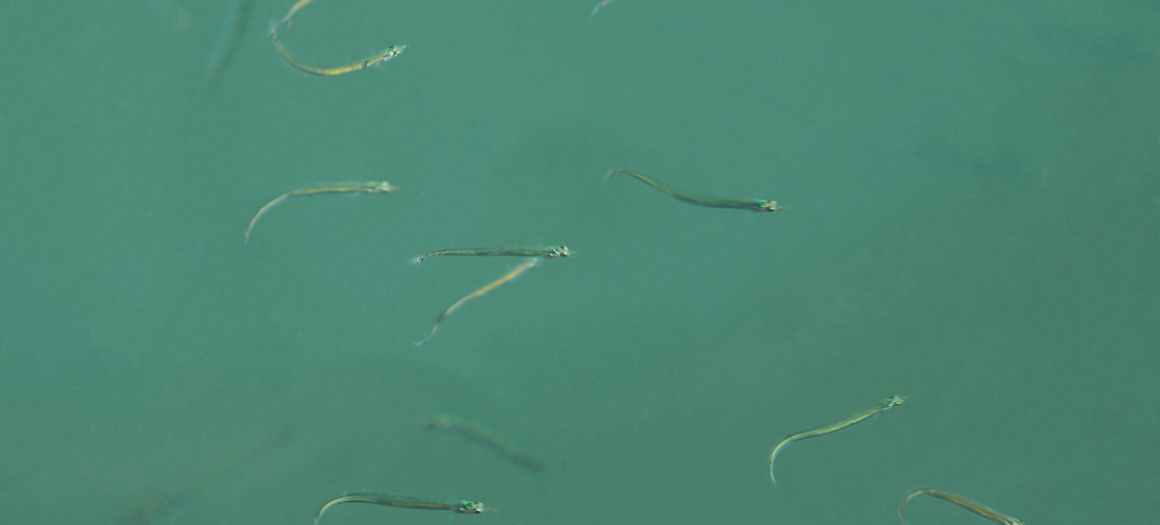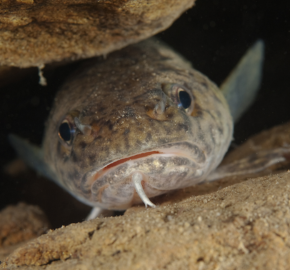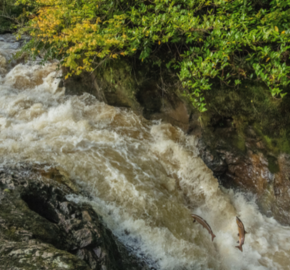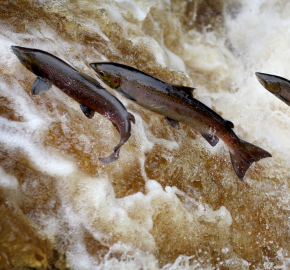DEFRA consultation on spatial management measures for industrial sandeel fishing

Fisheries Policy Advisor, John Hickey, looks at the latest DEFRA consultation for the improved management of Sandeels in the North Sea, a vital food source for Atlantic salmon and sea trout.
Sandeels: a vital food supply for Atlantic salmon and sea trout
Sandeels provide a rich energy source which is extremely important for fast-growing young fish. Healthy growth directly boosts the size and egg-laying potential of both Atlantic salmon and sea trout, which will directly increase their chances of contributing to abundant future populations.
The plight of wild Atlantic salmon
Populations of Atlantic salmon are currently facing significant threats and are assessed as ‘At Risk’ in many of our rivers. Ensuring a healthy environment for salmonids at all life stages, including in the river, estuary and at sea is vital.
To help protect salmon and sea trout in the marine environment, everyone is encouraged to comment on the important consultations on marine management that are currently taking place in relation to industrial sandeel fishing.
Consultation of the management measures for industrial sandeel fishing
The consultation led by DEFRA is open until Monday 29 May and focuses on the management measures for industrial sandeel fishing in the English waters of the North Sea.
“We want views from stakeholders on options for the future management of sandeels in UK waters. This includes potential measures set out in the consultation that could be introduced in English waters to reduce the detrimental impacts of industrial fishing on the marine ecosystem through the removal of sandeels”.
DEFRA
The spokesperson from DEFRA continued: “Sandeel stocks are under pressure from industrial fishing in the North Sea and this has subsequent consequences on the marine ecosystem. Vulnerable seabirds, commercially important fish species and sea mammals, including whales, depend on sandeel as a food source. Based upon expert scientific evidence, Defra proposes management measures for English waters that will reduce further impact on the marine ecosystem”.
WildFish response
Climate change and intensive industrial fishing are significant pressures on sandeel stocks in the North Sea. Without significantly improved management, the current pressure that the stocks are under will continue damaging the wider ecosystem of the North Sea. Industrial use of sandeels to supply the open net-pen salmon farming industry as a source of feed is completely unsustainable and damaging to a wider range of wildlife species including salmon and sea trout.
Based on the evidence presented, there is no other credible option but to close all of the English waters of the North Sea to industrial fishing for sandeels. This will allow the stocks of sandeels and other marine wildlife, dependent upon them, to begin to recover.
Transferring the problem from one place to another
There is a threat from the proposed plan, that should be highlighted. Stopping fishing for sandeels in the North Sea means that industrial fishery will most likely turn to other places and capture of other species to replace the almost 250,000 tonnes of sandeels currently being caught and turned into fish oil and fish feed.
The impact of capturing other species on salmonids
If this fishing industry was to move elsewhere and away from capturing sandeels, it is expected to turn to other species such as European sprat as an alternative. This fishing would likely take place in areas where stocks are not as well monitored and are not fully managed, such as in the Celtic Seas and West of Scotland. European sprat make up an extremely important part of the diet of our sea trout populations.
Summary
This consultation highlights the fact that most of our forage fish stocks are simply not as well managed as they should be. This is very obvious for sandeel and indeed, well known for mackerel, which are currently being overfished across the North East Atlantic.
It is important that responses to DEFRA clearly communicate that all forage fish stocks must be better and more sustainably managed in the future, as laid out in the Fisheries Statement and the Fisheries Act 2020.
- Overfishing should simply not be allowed to take place on any fish stocks.
- All stocks should be well managed following proper scientific advice on Total Allowable Catch (TAC).
- Importantly, vital ecological reference points must be included in decision-making.
- Setting ecosystem-based reference points (F eco) for all forage stocks is of critical importance.
- An improved and robust method for surveying and monitoring of all forage fish stocks should be introduced. Such as species level acoustic surveying.
- Decisions should be made in a precautionary manner, to fully protect both the fish stocks themselves, as well as the sensitive wildlife that is also dependent upon them.
Human activities on both land and at sea have degraded our freshwater, estuarine and marine ecosystems. These places urgently need to be restored and fully interconnected for wildlife to recover.
Have your say and respond to DEFRA on the improved management of Sandeels in the North Sea, a vital food source for Atlantic salmon and sea trout.
Click here to respond to the consultation



